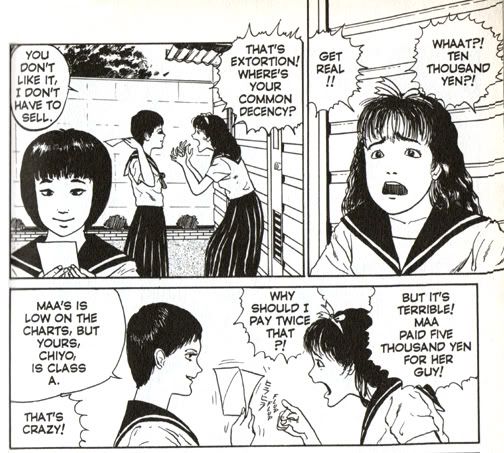 Like a drug dealer stringing along her addicted customers, Tsukiko isn't shy about jacking up the price. With everything going her way, she becomes full of herself, more than a little cocky. She's an arch-capitalist, working the free market angle without competition and little fear of legal reprisal. She's also her own best customer. She’s secretly in love with the slim, good-looking Yamazaki—but not above lying to him about profiting from the photos she takes. She tells him they’re for another girl and that they’re “strictly pro bono,” then giggles to herself in her room that night that her lie was just a white one. “Gray, maybe.”
Like a drug dealer stringing along her addicted customers, Tsukiko isn't shy about jacking up the price. With everything going her way, she becomes full of herself, more than a little cocky. She's an arch-capitalist, working the free market angle without competition and little fear of legal reprisal. She's also her own best customer. She’s secretly in love with the slim, good-looking Yamazaki—but not above lying to him about profiting from the photos she takes. She tells him they’re for another girl and that they’re “strictly pro bono,” then giggles to herself in her room that night that her lie was just a white one. “Gray, maybe.”But she's setting herself up for a big fall, too. Hubris and greed tend to pay off in misery in Ito Junji's dark world.
It doesn’t take long for transfer student and Ethics Committee member Tomie to catch onto Tsukiko’s business. She confronts the burgeoning paparazzo and confiscates all the photos in the name of school spirit. Strangely, Tsukiko’s customers side with her against Tomie. They’re totally in favor of letting Tsukiko exploit their feelings. Maybe these candid photos are a bit addictive. What would we think of her if Tsukiko were selling caffeine pills or even amphetamines to fuel late-night cram sessions? After all, Japanese high school kids are constantly preparing for massive multi-subject exams in addition to their club activities and occasional part-time jobs.
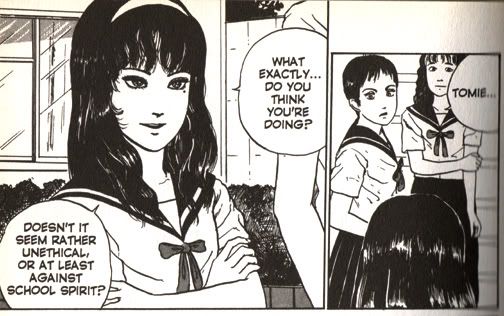 Cultural aside: I knew a high school girl who was a weekend fry cook at Denny’s, despite her high school’s express rules against any kind of employment. Then again, she couldn’t have cared less about all the tests she failed—her ambition was to become a flight attendant, not get into Keio or Tokyo Universities. And she made it!
Cultural aside: I knew a high school girl who was a weekend fry cook at Denny’s, despite her high school’s express rules against any kind of employment. Then again, she couldn’t have cared less about all the tests she failed—her ambition was to become a flight attendant, not get into Keio or Tokyo Universities. And she made it!Well, the last thing you want to do whether you’re a boy or a girl is attract Tomie’s attention. Tsukiko shows another facet to her personality-- she's got quite a temper.
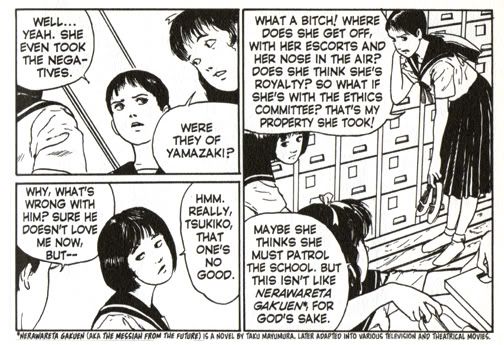 Tomie tricks Tsukiko into shooting her and discussing money-- Tomie is well-regarded for her beauty, Tsukiko openly suggests her portrait might fetch as much as 100,000 yen (roughly 1000USD). Just as Tomie plans, a faulty member overhears Tsukiko and the girl ends up suspended from school and grounded at home. Merely angry before, the unhappy Tsukiko vows revenge. But something strange has happened to every single photo she took. Putting on her school uniform-- most high school kids do this before setting foot on school grounds, even during vacation periods-- Tsukiko dumps dozens of prints out an upper story window.
Tomie tricks Tsukiko into shooting her and discussing money-- Tomie is well-regarded for her beauty, Tsukiko openly suggests her portrait might fetch as much as 100,000 yen (roughly 1000USD). Just as Tomie plans, a faulty member overhears Tsukiko and the girl ends up suspended from school and grounded at home. Merely angry before, the unhappy Tsukiko vows revenge. But something strange has happened to every single photo she took. Putting on her school uniform-- most high school kids do this before setting foot on school grounds, even during vacation periods-- Tsukiko dumps dozens of prints out an upper story window.Now Tomie is the angry one. And a story that seemed to be an almost naturalistic portrait of two girls who just don't get along turns into a suspense story worthy of Alfred Hitchcock-- Tomie's Ethics Club cronies actually pursue Tsukiko with murderous intent. It's no longer a game and Tsukiko feels the sting of betrayal from one very close to her heart.
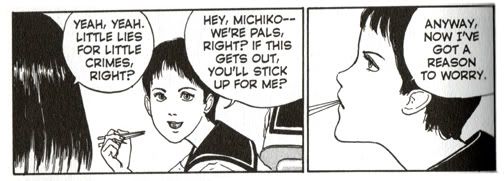 Things get even worse when an apparently cheerful Tomie shows up at the disgraced Tsukiko's apartment bearing convenience store snacks. Tsukiko's parents are gone and the girl now has to face a Tomie in her very own bedroom, an invasion of her personal space. Tomie has already destroyed Tsukiko's academic and social life-- albeit aided by the girl's own foibles. Now she attacks where Tsukiko should feel safest. Tomie is a monster who hides in plain site, for whom an ordinary afternoon is no deterrent. She's the poisonous friend.
Things get even worse when an apparently cheerful Tomie shows up at the disgraced Tsukiko's apartment bearing convenience store snacks. Tsukiko's parents are gone and the girl now has to face a Tomie in her very own bedroom, an invasion of her personal space. Tomie has already destroyed Tsukiko's academic and social life-- albeit aided by the girl's own foibles. Now she attacks where Tsukiko should feel safest. Tomie is a monster who hides in plain site, for whom an ordinary afternoon is no deterrent. She's the poisonous friend.Despite the lightness of her tone and contrite pose, there's definitely something menacing about her visit. She won't let Tsukiko leave the apartment, she makes small talk full of veiled menace, tells fanciful lies based on things she believes Tsukiko might like to hear-- and, most disquieting of all, she's brought a couple of boys from school who seem to live now to obey her every command. It's almost like an attempt at intimidation drawn straight from a yakuza film, all smiles and politeness masking sinister intent.
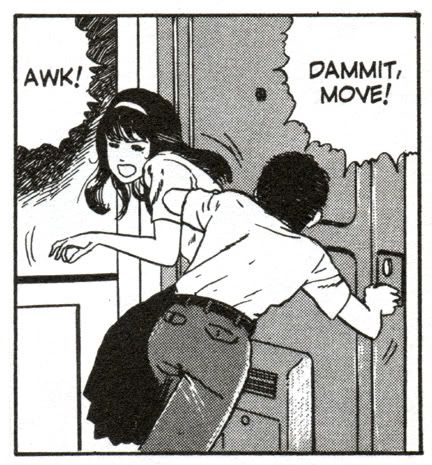 Things go horribly wrong for everyone involved in a turn reminiscent of some of the more lurid and grotesque scenes in John Carpenter's 1982 remake of The Thing, or a dream sequence from a David Cronenberg film.
Things go horribly wrong for everyone involved in a turn reminiscent of some of the more lurid and grotesque scenes in John Carpenter's 1982 remake of The Thing, or a dream sequence from a David Cronenberg film.Most of Tomie’s enemies are one-shot rivals, but Tsukiko carries the lead role through three chapters, one of the more extended and cohesive Tomie narratives. That she’s morally compromised and something of a stinker herself makes her all the more complex and attractive as a narrator. She’s engaging and fun, obviously not above a lie here or there, capable of ripping people off, but she's also completely open and honest with both herself and the reader. This makes her sympathetic, although she might easily have been something of a villain in a more conventional manga school romance plot. Certainly she benefits from running into someone or something much worse than herself. It's not every day someone as extortionate as Tsukiko meets an immortal engine of destruction.
Despite her flaws-- or because of them-- Tsukiko seems fresher than a lot of the other characters—a collection of sexually-obsessed men and boys driven to insanity, perversion and murder, or fragile, doll-like girls haplessly destroyed or absorbed by Tomie. With her gift of self-awareness, she reminds me of one of the self-eviscerating narrators from a Daniel Clowes story-- though she thoroughly lacks their self-loathing-- and her eventual fate has the same melancholic air about it as Enid Coleslaw's in Ghost World. While some of Clowes's narrators are the unreliable sort (Random Wilder and Mr. Ames from Ice Haven spring to mind), Tsukiko strikes me as completely honest as she relates these events in confessional mode. Otherwise, the leap from school comedy-drama to horror would be too jarring. Why else would she admit to her scam in the first place and her own crush on Yamazaki?
Because we can trust her, and because she apparently trusts us, we're free to like her.
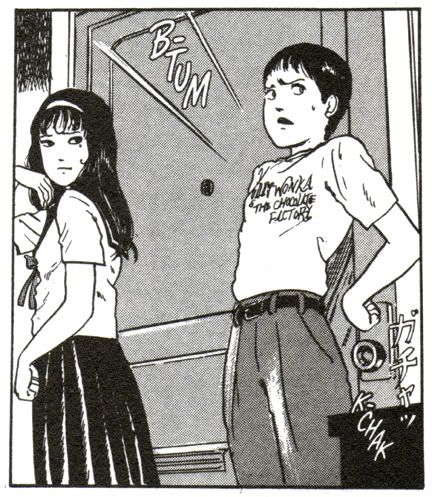 The ultra-feminine Tomie contrasts with her androgynous foe Tsukiko. Got to love Tsukiko's Willy Wonka tee.
The ultra-feminine Tomie contrasts with her androgynous foe Tsukiko. Got to love Tsukiko's Willy Wonka tee.Unlike many of the other female characters in the Tomie series, Tsukiko is an active rather than passive character, and has enough charm and depth to carry her own stories. You know, Tsukiko, the girl photographer—maybe working for a school newspaper, a kind of Japanese high school Kolchak. As far as I know, she hasn’t turned up in any of Ito Junji’s other tales, but it’d be fun to see her investigating the paranormal and squeezing her friends for a few bucks here and there to keep herself in film and lenses. She’s just that likeable. And, once again and not to spoil the ending, but it’s not as if she gets off scot-free; her lies and crimes against her friends are what get her into this huge Tomie-mess in the first place, and have lasting consequences for her.
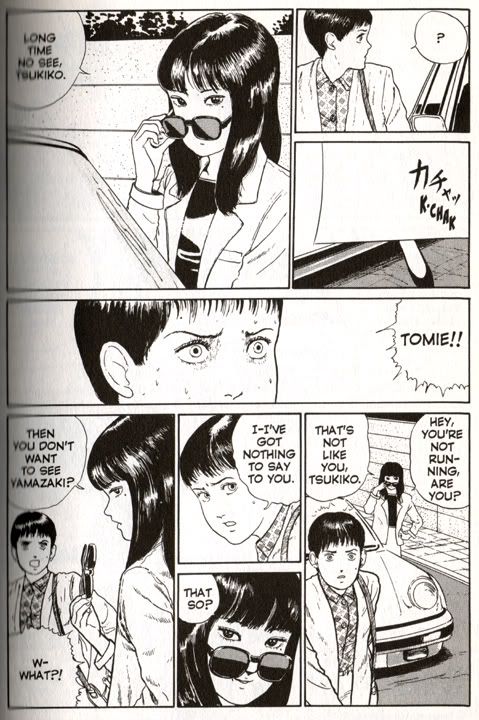 The driving age in Japan is 18, but Tomie exists to violate laws and mores. But I guess if you had access to a Porsche 911, you might not let a little thing like not having a driver's license stop you from flaunting it. I suppose this could be after high school graduation, but Ito Junji leaves it ambiguous.
The driving age in Japan is 18, but Tomie exists to violate laws and mores. But I guess if you had access to a Porsche 911, you might not let a little thing like not having a driver's license stop you from flaunting it. I suppose this could be after high school graduation, but Ito Junji leaves it ambiguous.Once she’s in your life, there’s just no getting rid of Tomie.

No comments:
Post a Comment